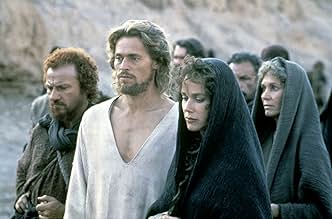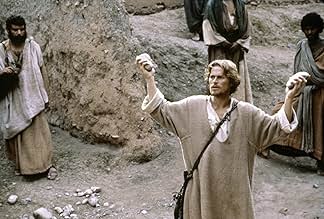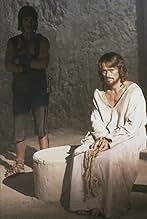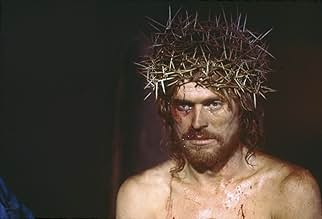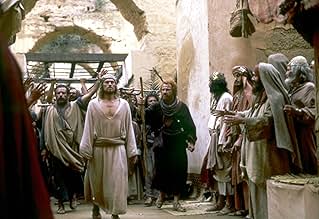La vida de Jesucristo, su viaje a través de la vida al enfrentar las luchas de todos los humanos y su tentación final en la cruz.La vida de Jesucristo, su viaje a través de la vida al enfrentar las luchas de todos los humanos y su tentación final en la cruz.La vida de Jesucristo, su viaje a través de la vida al enfrentar las luchas de todos los humanos y su tentación final en la cruz.
- Dirección
- Guionistas
- Elenco
- Nominado a 1 premio Óscar
- 2 premios ganados y 7 nominaciones en total
Steve Shill
- Centurian
- (as Steven Shill)
- Dirección
- Guionistas
- Todo el elenco y el equipo
- Producción, taquilla y más en IMDbPro
Opiniones destacadas
10CSM126-1
Condemned by Fundamentalists upon release, delayed by outcries from hypocrites and liars, and boycotted in any city where it played "The Last Temptation of Christ" is one of the most controversial movies ever made. Instead of showing Christ as a fearless and perfect person, "The Last Temptation" depicts Him as a person who fought his destiny and wished to be just another mortal human being. Religious groups who couldn't (and still can't) accept the fact that Jesus was human were shocked by such ideas and refused to see the film or read the landmark novel on which it was based. They'll never know that they attacked one of the most honest and loving depictions of Christ.
The Christ we see in the film is not based on the teachings of the Gospels, or any scripture for that matter. Instead we get a portrait of Christ the man, not Christ the Savior. We get to see his faults, his fears and anxieties. Then, we get to see him overcome those and find the strength to fulfill his destiny. The Last Temptation of Christ is not afraid to say that Jesus was weak before he became the Savior, and that makes the film all the more satisfying. This is a tale of redemption, courage, and love like no other.
There is no reason to miss this film. Not everyone will like it, but at the very least it will let you see another perspective of the story. And even if you can't accept the story, you won't be able to deny the greatness of Scorsese's direction. From the epic crowd scenes, to the intimate one-on-one conversations, to the stunning final shot (which was actually caused by an overexposed section of film, but is beautiful nonetheless), you will be awed by Scorsese's work here.
Also stunning is the work of the two leads. Willem Dafoe inhabits the role of Christ perfectly, bringing perfectly controlled emotion to each and every scene. Harvey Keitel as Judas has been the subject of debate because of his NYC accent. That was on purpose (Scorsese used accents to denote the descent of characters. American accent = Israelite; British accent = Roman), but it doesn't even matter. Keitel is brilliant no matter what his accent is.
Honest, human, loving, and unafraid, "The Last Temptation of Christ" is one of the great cinematic achievements of all time. Martin Scorsese crafted with this film his most personal masterpiece, and perhaps his greatest masterpiece ever.
The Christ we see in the film is not based on the teachings of the Gospels, or any scripture for that matter. Instead we get a portrait of Christ the man, not Christ the Savior. We get to see his faults, his fears and anxieties. Then, we get to see him overcome those and find the strength to fulfill his destiny. The Last Temptation of Christ is not afraid to say that Jesus was weak before he became the Savior, and that makes the film all the more satisfying. This is a tale of redemption, courage, and love like no other.
There is no reason to miss this film. Not everyone will like it, but at the very least it will let you see another perspective of the story. And even if you can't accept the story, you won't be able to deny the greatness of Scorsese's direction. From the epic crowd scenes, to the intimate one-on-one conversations, to the stunning final shot (which was actually caused by an overexposed section of film, but is beautiful nonetheless), you will be awed by Scorsese's work here.
Also stunning is the work of the two leads. Willem Dafoe inhabits the role of Christ perfectly, bringing perfectly controlled emotion to each and every scene. Harvey Keitel as Judas has been the subject of debate because of his NYC accent. That was on purpose (Scorsese used accents to denote the descent of characters. American accent = Israelite; British accent = Roman), but it doesn't even matter. Keitel is brilliant no matter what his accent is.
Honest, human, loving, and unafraid, "The Last Temptation of Christ" is one of the great cinematic achievements of all time. Martin Scorsese crafted with this film his most personal masterpiece, and perhaps his greatest masterpiece ever.
This adaptation of Nikos Kazantzakis's novel, directed by Martin Scorsese, caused quite a stir on its initial release, accused of blasphemy and of causing offence to the Christian religion.
However, in its depiction of Jesus Christ as a human being rather than a man divine, it gets to the core of his story. This is a man who makes the choice of self-sacrifice for the good of his fellow men, despite the temptations of an alternative life - shown in this film by a life with Mary Magdelene rather than dying at the Crucifixion.
Played by Willem Dafoe with great sensitivity, this Christ performs miracles and discusses the intricacies of life and death with his disciples. Harvey Keitel is Judas, a rough man who fails to understand the significance of being the chosen Son of God; while Barbara Hershey is an effective Magdelene. David Bowie makes a short appearance as Pontius Pilate and is surprisingly good.
'The Last Temptation of Christ' is not one of Scorsese's best films but it certainly sparks questions and leaves food for thought. Some of the imagery is superb and the script is coherent and of a high standard.
However, in its depiction of Jesus Christ as a human being rather than a man divine, it gets to the core of his story. This is a man who makes the choice of self-sacrifice for the good of his fellow men, despite the temptations of an alternative life - shown in this film by a life with Mary Magdelene rather than dying at the Crucifixion.
Played by Willem Dafoe with great sensitivity, this Christ performs miracles and discusses the intricacies of life and death with his disciples. Harvey Keitel is Judas, a rough man who fails to understand the significance of being the chosen Son of God; while Barbara Hershey is an effective Magdelene. David Bowie makes a short appearance as Pontius Pilate and is surprisingly good.
'The Last Temptation of Christ' is not one of Scorsese's best films but it certainly sparks questions and leaves food for thought. Some of the imagery is superb and the script is coherent and of a high standard.
Has there ever been a more misunderstood film than Martin Scorcese's The Last Temptation Of Christ? Released amid great controversy and accused of being an offensive and unholy film, the truth of the matter is that it is a deeply reverent work which has the courage to ask challenging questions about the pressures and doubts Jesus must have experienced as the appointed Messiah. It also shows the violence of the times in graphic detail. If viewers consider it blasphemous to explore on film the immense burden of duty that Jesus bore through his life, then they are narrow-minded and ignorant. If people feel that to show the brutality and harshness of life in Roman times is tasteless and inappropriate, then they are guilty of glorifying difficult but factual truths. There is NOTHING offensive about this film. There is, however, much that is challenging.
Jesus (Willem Dafoe), an honest carpenter, saves Mary Magdalene (Barbara Hershey) from a stoning. Already dimly aware that he is destined to lead an extraordinary life, he soon finds himself being drawn into the role of a religious figurehead. But Jesus finds it hard to accept that he is a Messiah, and as his reputation and following grows he constantly questions if he is a strong enough man to handle the burden of being God's son. After isolating himself in the desert, where he experiences several hallucinations in which he is confronted by visual manifestations of good and evil, Jesus finally concludes that he IS the true son of God and whole-heartedly sets about imparting his love and wisdom to all who'll listen. Later betrayed to the disgruntled Romans by his friend Judas Iscariot (Harvey Keitel), Jesus is crucified. While on the cross, he imagines what his life would have turned out like if he had shied away from his duty as the Messiah and lived life like a mere mortal.
It is this final section of the film that has provoked the most vociferous outrage. The sequence shows Jesus as he slowly dies on the cross, dreaming of an alternative life in which he sins and copulates and hates like all normal people. Many people have criticised the film on the grounds that these scenes are blasphemous. Such claims are nonsense - the film is not saying that Jesus was a sinner, nor that he gave in to temptation of the flesh, nor still that he was a man filled with hate. The film is merely saying that, in such great pain and so close to death while still just a young man, he might - just maybe - have wondered if it was all worth it. At the end of the film, we see Jesus accept his role knowing that his death is the ultimate act of unselfish love, so the film actually is totally in agreement with what all Christians believe. If the film had come to the conclusion that Jesus's whole life was a waste, his death too, then maybe the detractors would've had cause to complain. But how can they possibly be offended by the film as it stands? For goodness sake, it's a film about absolute faith!!! In truth, The Last Temptation Of Christ is an excellent movie. Compellingly acted, beautifully shot on Moroccan locations, and full of telling ideas, it is a work of real depth and power. The accents are sometimes distracting and some of the dialogue occasionally betrays ill-suited modernisms, but apart from these minor drawbacks it is one of the most important and thought-provoking films ever made.
Jesus (Willem Dafoe), an honest carpenter, saves Mary Magdalene (Barbara Hershey) from a stoning. Already dimly aware that he is destined to lead an extraordinary life, he soon finds himself being drawn into the role of a religious figurehead. But Jesus finds it hard to accept that he is a Messiah, and as his reputation and following grows he constantly questions if he is a strong enough man to handle the burden of being God's son. After isolating himself in the desert, where he experiences several hallucinations in which he is confronted by visual manifestations of good and evil, Jesus finally concludes that he IS the true son of God and whole-heartedly sets about imparting his love and wisdom to all who'll listen. Later betrayed to the disgruntled Romans by his friend Judas Iscariot (Harvey Keitel), Jesus is crucified. While on the cross, he imagines what his life would have turned out like if he had shied away from his duty as the Messiah and lived life like a mere mortal.
It is this final section of the film that has provoked the most vociferous outrage. The sequence shows Jesus as he slowly dies on the cross, dreaming of an alternative life in which he sins and copulates and hates like all normal people. Many people have criticised the film on the grounds that these scenes are blasphemous. Such claims are nonsense - the film is not saying that Jesus was a sinner, nor that he gave in to temptation of the flesh, nor still that he was a man filled with hate. The film is merely saying that, in such great pain and so close to death while still just a young man, he might - just maybe - have wondered if it was all worth it. At the end of the film, we see Jesus accept his role knowing that his death is the ultimate act of unselfish love, so the film actually is totally in agreement with what all Christians believe. If the film had come to the conclusion that Jesus's whole life was a waste, his death too, then maybe the detractors would've had cause to complain. But how can they possibly be offended by the film as it stands? For goodness sake, it's a film about absolute faith!!! In truth, The Last Temptation Of Christ is an excellent movie. Compellingly acted, beautifully shot on Moroccan locations, and full of telling ideas, it is a work of real depth and power. The accents are sometimes distracting and some of the dialogue occasionally betrays ill-suited modernisms, but apart from these minor drawbacks it is one of the most important and thought-provoking films ever made.
I thought this movie was an excellent piece of film making. A fabulous score and stunning cinematography take us through the inner struggle of Jesus in accepting his role and his duty. It tells how he faced temptation, ridicule , torture and triumph. Before you burn my name in effigy for liking this movie, be open minded and just experience a good film. The "disclaimer" at the beginning of the movie says it all. It is not necessarily based on events in the Bible. Just as Jesus used parables as a way of teaching, this movie tells a story of a man's life and events that we can all somehow personally relate to. By the way, the portrayal of Satan was the best I've seen yet.
If you want a new perspective on an old story this film is for you. I can see why so many devout christians were upset about this film because it really presents a Jesus that is threatnig to traditional beliefs. If you have read Kazantzakis' novel the intro outlines he true nature of this story. It deal primaraly with the idea of being both human and god and what kind of implications that might have had on Jesus as an individual. Scorsese shows us Jesus' personal stuggle to try and deny his importance as he wants to reced into the life of a normal person. At no time did Scorsese or Kazantzakis claim this story to be anything but fiction, however it does make you wonder about the psyche of "the christ."
What Scorsese Film Ranks Highest on IMDb?
What Scorsese Film Ranks Highest on IMDb?
Cinema legend Martin Scorsese has directed some of the most acclaimed films of all time. See how IMDb users rank all of his feature films as director.
¿Sabías que…?
- TriviaWillem Dafoe could not see for three days, because he got too many eye drops to dilate the pupils of his eyes in bright sunlight to achieve a superhuman effect.
- ErroresWhen the first man is being crucified, as he yells when the soldier nails his hand, we can see a lot of metal fillings in his upper teeth.
- Créditos curiosos"This film is not based upon the Gospels but on this fictional exploration of the eternal spiritual conflict."
- Versiones alternativasMost DVD and streaming versions are missing Judas's line, "It's Magdalene; she deserves it," right before the attempted stoning scene. The line can be heard on the Criterion Blu-ray.
Selecciones populares
Inicia sesión para calificar y agrega a la lista de videos para obtener recomendaciones personalizadas
Detalles
- Fecha de lanzamiento
- Países de origen
- Idioma
- También se conoce como
- The Last Temptation of Christ
- Locaciones de filmación
- Moulay Ismael Stables, Villa Imperiale, Meknès, Morocco(Pontius Pilate's palace - Passover baths - interiors: the Temple)
- Productoras
- Ver más créditos de la compañía en IMDbPro
Taquilla
- Presupuesto
- USD 7,000,000 (estimado)
- Total en EE. UU. y Canadá
- USD 8,373,585
- Fin de semana de estreno en EE. UU. y Canadá
- USD 401,211
- 14 ago 1988
- Total a nivel mundial
- USD 8,866,379
- Tiempo de ejecución2 horas 44 minutos
- Color
- Relación de aspecto
- 1.85 : 1
Contribuir a esta página
Sugiere una edición o agrega el contenido que falta


